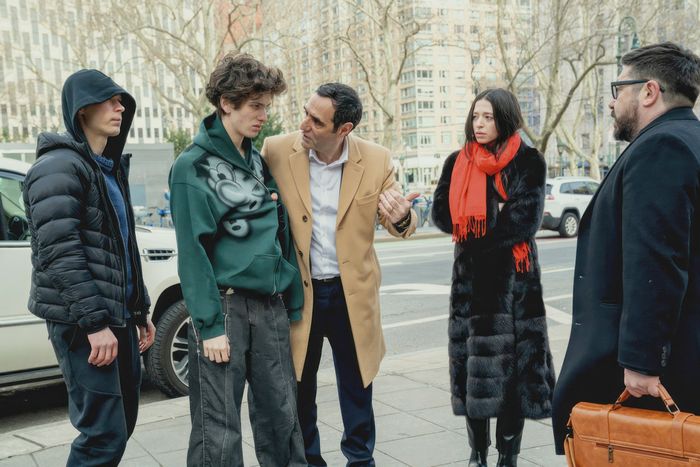
This article was published on October 18, 2024. At the 97th Academy Awards, Anora won five Oscars, including Best Picture.
For a long time, Sean Baker has made movies where slippage with reality is the point. Whenever he starts a project, he talks his way into a social world where he’s almost guaranteed to be the only guy from upper-middle-class New Jersey, convinces its inhabitants to play ball, and gleans details from their lives to inform the film. He’s used this approach to tell stories about delivery guys, counterfeit-bag hustlers, wannabe porn stars, and desperate single mothers. These are not documentaries, though Baker says he wants them to feel like they are; in some films, he’s tried to achieve that by shooting with shaky handheld camcorders or souped-up iPhones. Some scenes he’ll shoot Candid Camera style, sending actors to mingle with passerby who he then chases down with a release form. Many of his actors are first-timers. Baker made his name doing things this way, breaking out in 2015 with his fifth feature, Tangerine, about two young trans sex workers pounding the L.A. pavement. Since then, he’s become widely known and awarded for making movies about the American lives taking place — as critics love to put it — “on the margins.”
His films tend to be skeptical of the system. The characters’ journeys are littered with Catch-22s, maybe most of all in 2017’s The Florida Project, which is set among the accidentally long-term residents of a motel outside Orlando: When single mother Halley loses her job at a strip club because she doesn’t want to sleep with clients, she also loses her state benefits. This pushes her toward sex work anyway, and she ends up losing custody of her child. It’s tempting to assume that a filmmaker who makes this many movies about poor and working people would have a politics that swings left. This is not something that Baker has been eager to confirm. When interviewers ask why he gravitates toward these stories, he says it’s because he wants to represent people who aren’t usually seen onscreen. “The fact that both Democracy Now! and Ben Shapiro loved it and thought it was the best film of the year, that said a lot to me,” he said of The Florida Project. “We’re doing the right thing, actually, because we’re telling these stories that can be discussed by both sides.” He has admitted that the scheming protagonist of his 2021 film Red Rocket, a washed-up porn actor, has something in common with Trump. However, he added, “I also try to stay politically as neutral as possible because one of the themes I’m tackling with this film is division.”
The Anora Reader
Which makes his latest film, Anora, an outlier. For the first time, Baker gives his narrative a clear ruling-class villain — someone who the other characters can see, hear, and obey, or be crushed by. If his previous films imply a stacked deck, they stay vague about who stacked it. Anora just tells us: It was the ultrarich.
It kicks off like a rom-com in which Anora (Mikey Madison) and Ivan (Mark Eydelshteyn) are in love. Well, maybe not in love. But Anora and Ivan are married, and for the first time in a long time, Ani — as she’d rather be called — is chilling and having fun. No more late nights at the midtown strip club where she was working as a dancer when Ivan rolled in, all wide blue eyes and cute Russian accent. He’s a boyish 21 to her womanly 23, a difference that hardly matters when he’s shoving hundreds in her G-string. He asks her to make a house call for sex and she likes him enough to say yes. When she sees his Brooklyn mansion, she likes that enough to say yes again. He tells her who his infamous father is, and it registers, kinda; though Ani learned some Russian from her grandmother, she’s not tuned in to what’s happening there. All she knows is she’s found the world’s least-threatening high roller. One thing leads to another which leads to Las Vegas where she becomes, as she puts it, Ivan’s “little wifey.” For him, marriage means a hot girl and a green card. For her, it’s a ticket out of her life. “You hit the lotto, bitch!” says one of her friends at the club when Ani goes back to clear out her locker. We know by now that Anora’s an odd-couple story, but it’s not the odd couple we expect. Because once Ivan’s parents hear about his marriage, they want it annulled — and the three henchmen they unleash to get the job done become both Ani’s nemeses and her allies, whether any of them likes it or not.
Baker’s explored the friction between the servers and the served since 2004’s Take Out, his second feature and the only one he’s co-directed, with Shih-Ching Tsou. (The Taiwanese filmmaker later produced and acted in several of Baker’s films.) In Take Out, a vérité-inspired slog that stretches over one long New York day, an undocumented Chinese restaurant delivery guy named Ming Ding struggles to make enough tips to get a loan shark off his back. He brings order after order to the apartments of customers who range from polite and perfunctory to pissed off and racist. (“No speaky English?” mocks one.) The relationship is one of mutual resentment and disinterest; Ming Ding just needs enough of these interactions to hit his goal. Other Baker films get into the marriages of convenience that happen in the legal gray zone — like the partnership, in 2008’s Prince of Broadway, between West African men who hustle counterfeit bags and the Lebanese guy whose midtown storefront he offers them as a showroom and stash spot in exchange for a cut of the proceeds.
Ani’s mistake is to see her relationship as a luxury version of the latter, a marriage of convenience in a sable fur coat. Really it’s the former: a straight-ahead hierarchy of the server and the served. In her mind, she’s a hustler who knows her worth; why shouldn’t she join Ivan’s family? It’s up to the goons to enlighten her. When the henchmen show up at Ivan’s mansion and tell him his parents are on their way from Russia to get this marriage deleted, Ivan is so scared that he takes off on foot, abandoning his wife to the exasperated Armenian fixer Toros (longtime Baker collaborator Karren Karagulian), Toros’s brother Garnick (Vache Tovmasyan), and Igor (Yura Borisov), the young Russian they’ve brought along to help. “You don’t understand. He shamed his family by marrying someone like you,” Toros yells at Ani. He threatens to have her arrested — “I’m sure you already have a criminal record. One, two, three, you’re in jail” — and calls her a “hooker” and a “prostitute.” He’s also the first one to level with her: Her husband is a nightmare. “I am telling you, you do not know this guy,” he says. “I’ve been dealing with his shit since he was 6 years old.”
So Ivan’s gone. His parents have yet to be seen. That leaves Ani and the henchmen, stuck together. By introducing, then removing, the richest and most powerful characters, Baker sets up a present absence that hangs over much of the film. Neither Toros nor Ani can move forward without Ivan: Toros because his bosses will annihilate him, and Ani because she can’t give up on the fairy tale. After a wildcat screwball fight scene between Ani and the guys — she nearly wins; a kick from a pole dancer’s no joke — they accept their mission: Find the brat.
They pile into Toros’s Suburban and start looking. “He fucked me way harder than he fucked you,” rants Toros as he, Ani, Garnick, and Igor canvass the streets of South Brooklyn. Ani smirks (“Oh, yeah?”), but it really might be true. As day turns to night with no end in sight, it becomes clear that working for the oligarchs can be hell. Toros despises the kid and fears the parents, who have the power to ruin his life; he warns the guys that when they do eventually catch Ivan, they shouldn’t touch him — hurting the princeling could cost them more than their jobs. Meanwhile, Garnick, who thought his brother had a good thing going, can’t believe how thankless the gig really is: “I didn’t sign up for this,” he groans. “I want to go back to Armenia!” Igor stands apart from the brothers. In some ways, he’s more like Ani, a bit of freelance muscle using his body to pay the bills. We can see early on that he’s attracted to Ani’s defiance, even if she’s calling him a “gopnik” and a “faggot-ass bitch.” Even if he understands the danger she’s in better than she does.
Anora is Baker’s strongest film because it has a clearer point of view than his others; by the end, it couldn’t be plainer that Ani and the henchmen share an enemy. Of course, a Russian oligarch is also an easy bad guy for a filmmaker shy about politics. A palatable choice that neither Democracy Now! nor Ben Shapiro would dispute. As with all of Baker’s characters, the shape of Anora’s oligarchs brushes with reality; the exteriors of Ivan’s house were shot at a compound in Mill Basin, Brooklyn, which previously belonged to the ex-wife of a Russian billionaire. (New York profiled their daughter back when she was touted as the “Russian-American Paris Hilton.”) Ivan’s family’s cartoonish wealth, all private jets and mansions, allows for the kind of judgment that Baker’s previous films avoided. The filmmaker has been skittish about this, as always: “If I’m too calculated, like ‘This is my grand statement on late-stage capitalism,’ I’ll get a little contrived, I’ll get a little preachy,” he told one reporter. “But it’s hard to ignore it in a country more divided by the day.” There’s also no ignoring that Baker gave himself room to punch up.
Ani and Ivan were never going to work. Ani and Igor, however — you start to wonder. There’s a frisson between the two from their earliest scenes together. While Toros will never admit he has more in common with a sex worker from Brighton Beach than he does with his bosses, Igor is free of that baggage. He’s attracted to Ani. More than that, he recognizes her; he may see in her an anger toward the ruling class he’d like to express himself. As the indignities pile up and Ani’s dream crumbles, Baker positions us to see the scene through Igor’s eyes. We watch him attempt to care for her, undeterred by Ani’s bitterness. Late in the film, the two find themselves alone. Igor turns to her with words of comfort and solidarity. “It’s good that you’re not part of this family,” he says. Ani’s not about to give him that: “Did I ask for your fucking opinion?”



